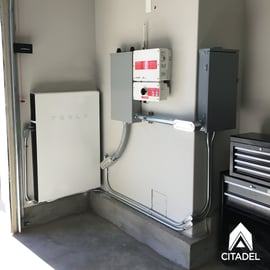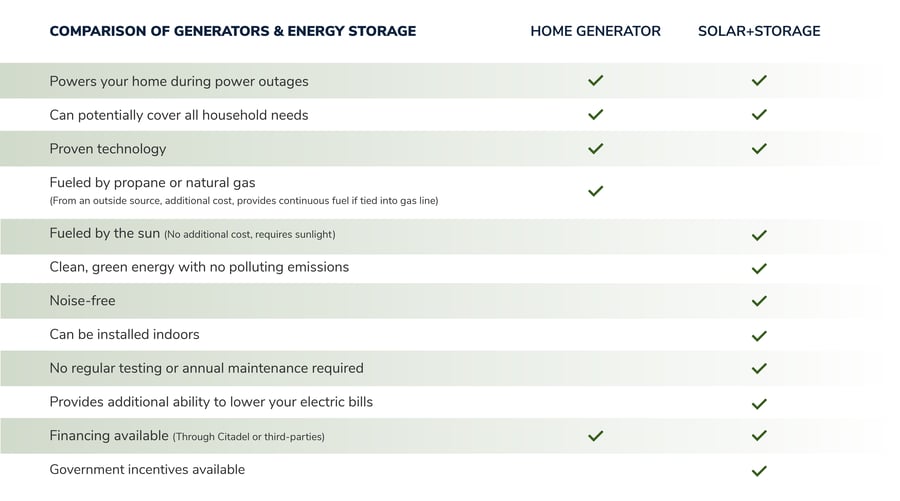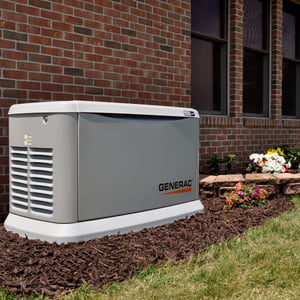If you’re in the market for a product that will provide your home with electricity during power outages, you have two options—a generator or an energy storage system. Each product can be installed on its own or mixed and matched in numerous ways, including:
- A Generator alone
- Solar+Storage*
- A Generator and Solar+Storage
Which is best for your home and your wallet? We detail the pros and cons of the two products and then discuss the three options listed above, so you can decide.
If you’re still not sure, contact Citadel Roofing & Solar and we’ll help determine the best option for your energy goals.
*Note: “Standalone” storage, which is charged with electricity from the utility grid, is also an option. But most people pair storage with solar panels because the combination qualifies for government incentives and lets you charge your battery during an outage. In the rest of this post, we assume storage is paired with solar energy.
Similarities Between Energy Storage & Generators
First, let’s consider how the two product options—generators and storage (sometimes called a battery backup system)—are alike
- Main Benefit: Residential energy storage systems and generators both offer power outage protection, providing electricity to power some or even all of your household energy needs during utility power outages. It doesn’t matter if the outage is from a storm, a natural disaster, utility equipment failure or a forced blackout to reduce the risk of utility equipment sparking a wildfire. Generators and storage typically can be used in all of those situations. (A generator connected to the home’s natural gas supply would not be useable if the gas service is cut off by the utility or Mother Nature in a disaster situation.)
- Scalable Coverage: Generators and energy storage are often configured to power the most important electrical circuits in a home, such as Internet and office equipment, the refrigerator and some lighting. But homeowners increasingly opt for larger systems that can power all of their homes’ needs. Why? Because they can. Today’s products are more cost-effective and powerful than ever.
- Price: You might think the newer technology—energy storage—would be more expensive than a generator. That used to be true. But as more powerful generators have been built and storage costs have come down, prices have evened out. Citadel’s experts can determine which product is more cost-effective for you based on your electricity usage and emergency backup needs.
- Proven Technologies: Generators have been around for ages although today’s versions are much quieter and efficient than the products of old. And energy storage systems rely on tried-and-true lithium-ion battery technology.
- Size: Both products require roughly the same amount of space.
Differences Between Energy Storage & Generators
Next, let’s look at how generators and energy storage systems differ from each other.
- Basic Operation: A generator produces electricity in real-time. A storage system draws on electricity stored in batteries.
- Fuel Source: Generators are powered by natural gas or propane. You can provide that fuel yourself or have the generator tied into your home’s natural gas line. If you do the latter, you will have a continuous supply of fuel during an outage. Just be aware that continuous operation of a generator can be costly during an extended outage. Calculate your cost by checking your bill for your gas unit price. In general, the cost of running your generator just eight hours a day would probably range from:
-
-
-
- $30 - $115 for propane
- $40 - $145 for natural gas
-
-
Storage systems are fueled by the sun, which can continue charging your battery during a utility outage (if the sun is shining). This application is particularly helpful during natural disasters when traditional fuel sources may not be accessible.
- Emissions: Because generators are powered by fossil fuels, they generate carbon dioxide and other pollutants. Storage, on the other hand, is powered by clean, green solar energy.
- Ventilation: Because of those emissions, generators require ventilation. This is one reason generators are installed outside whereas storage systems can be installed in the home’s garage or basement as well as outside.
- Noise: Generators produce more noise that storage systems, although newer model generators are much quieter than previous ones. Storage systems have an internal fan but operate as quietly as your refrigerator.
- Maintenance: A generator requires regular testing and annual maintenance to keep the system tuned up and ready to go, whereas storage requires no regular maintenance.
- Payment Options: Storage paired with solar often qualifies for solar loans and Power Purchase Agreements (PPA), some of which require no money down. Generators can be financed with special home improvement loans.
- Government Incentives: Solar+Storage systems are eligible for programs that reduce the system’s price to you:
- The federal Investment Tax Credit (ITC), which in 2020 covers 26 percent of the system’s price; the rate drops to 22 percent in 2021
- California’s Self-Generation Incentive Program (SGIP) rebate
- Lower Electric Bills: Solar alone reduces your electric bills because the solar electricity you produce costs less than the electricity you buy from the utility. Pairing storage with your solar energy system helps you save even more, by drawing from your stored electricity when utility rates are most expensive. This gives you greater control over your energy costs. (Generators do not directly affect your electricity bills.)
Comparing Energy Storage & Generators
Here’s a summary of the pros and cons of home generators and energy storage (again, paired with solar panels).

Mixing and Matching Generators and Energy Storage in Your Home
Let’s go back to the three options we listed at the beginning. We’ve already determined that any of those options will power some or all of your home’s electricity needs during an outage. But which is best? It depends on your needs. 
1. A Generator alone is a simple solution, no fuss no muss. It’s ideal if you want a backup power source that is constant, i.e. tied into your home’s gas line so you won’t run out of fuel during an outage. Just be aware that this can get expensive during an extended outage.
2. Solar+Storage is an environmentally friendly option that has the added benefit of reducing your electric bills even more than solar alone can do. It’s virtually maintenance-free and usually qualifies for generous government incentives that reduce your cost. Most important, it allows you to make and use your own solar electricity during a power outage, provided the sun is shining. (With a solar-only system, you can’t capture the solar energy hitting your panels during an outage.)
3. A Generator and Solar+Storage may be warranted for homeowners who need redundancy and flexibility to ensure their critical energy needs will be met. This combo package provides two emergency backup power sources: the energy storage system with batteries charged from your solar energy panels, and the generator. You choose which backup source to use when, based on your needs and how long the power outage lasts. For example, in an extended outage you might draw from your battery until it’s depleted, and then switch to the generator. Once the battery has been recharged by the sun, you could switch back to that cleaner, most cost-effective source.
More Resources
When solar energy panels first became mainstream, almost ten years ago, the biggest complaint was that they didn’t provide electricity during a power outage. Now, by pairing solar with storage, homeowners can get that important benefit.
At the same time, generators have become increasingly powerful and can cover most or all of a home’s circuits during an outage.
Contact us today to learn more about how you can protect your home and family during electricity outages, or visit these resources to learn more:
- Our blog post, Wildfire Season is Coming: Protect Yourself from Utility Outages, provides guidance to help you decide if you need backup power in your home, and provides an overview of how storage and generators work
- Our Generators webpage
- Our webpage on Citadel’s Storage products
- Our Learn webpage on Storage technology and incentives


